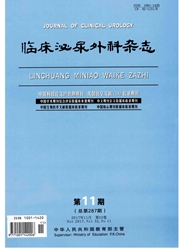

 中文摘要:
中文摘要:
维生素D对人体具有重要作用如调节钙和磷的平衡、调节骨生长发育等,主要在皮肤、肝脏、肾等器官合成。在人体中其合成分解的酶众多,对维持着维生素D的平衡具有重要作用。有大量研究发现维生素D对前列腺癌细胞具有抑制作用,其主要机制包括G1/S细胞周期阻滞,凋亡、分化、基因表达变化,以及抑制肿瘤血管生成和细胞迁移等实现的。而维生素D的生物学效应是通过与维生素D受体(VDR)起作用的,VDR是多结构域、配体诱导的转录因子,类似于AR(雄激素受体)和其他核受体。近年来有研究发现VDR单核苷酸多态性(SNPs)如FokI,BsmI,ApaI和TaqI的基因型多态性,VDR与AR交互作用等与患前列腺癌风险有关,不过其具体机制尚未明确。前列腺癌的发生、发展机制十分复杂,还需更广泛、深入的研究来明确。
 英文摘要:
英文摘要:
Vitamin D plays an important role in regulating calcium and phosphorus balance,bone growth and development.It's synthesized mainly in the skin,liver,kidney and other organs.In the body of its synthesis of many enzymes,the maintenance of the balance of vitamin D plays an important role.Cell cycle arrest,apoptosis,differentiation,gene expression changes,and inhibition of tumor angiogenesis and cell migration are the main mechanisms of the inhibition of vitamin D on prostate cancer cells.The biological effect of vitamin D is through the role of vitamin D receptor(VDR),VDR is a multi-domain,ligand-induced transcription factors,similar to AR(androgen receptor)and other nuclear receptors.In recent years,studies have been found that VDR single nucleotide polymorphisms(SNPs)such as FokI,BsmI,ApaI and TaqI genotype polymorphism,the interaction between VDR and AR are associated with prostate cancer risk,but its specific mechanism has not been clear.The development mechanism of prostate cancer is very complex and needed more extensive and indepth studies to clear.
 同期刊论文项目
同期刊论文项目
 同项目期刊论文
同项目期刊论文
 期刊信息
期刊信息
